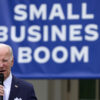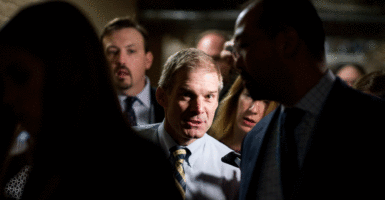House conservatives can picture a place for themselves in President-elect Donald Trump’s world, but it’s not so black and white.
In one sense, conservatives say, they can be natural allies to Trump who will be a “bridge” to Republican leadership, and the White House, in order to pass contested legislation.
But conservatives also promise to be a “check” against the future president if his plans veer far from their fiscally austere principles, and if Trump makes heavy use of executive actions.
“He is going to come here with some proposals, and we will agree with some proposals, and disagree on other proposals,” said Rep. Raúl Labrador, R-Idaho, a leader of the conservative House Freedom Caucus. “But we will be working with the administration to make America stronger, more prosperous, and to do things that frankly President [Barack] Obama has not been able to do in the past eight years. And we are pretty excited about that.”
Labrador, and some of his peers, tried to make sense of the presidential election result, and define their future roles, during a public event for reporters on Capitol Hill on Wednesday.
Conservatives, especially House Freedom Caucus members, were adamant that they won’t give Trump’s policies a free pass just because he belongs to their party, and shares a similar voting base.
Indeed, some of Trump’s proposals defined in the presidential campaign carry high price tags, like his vow to implement a major infrastructure plan—conservatives blocked Obama from doing this—and build a wall across the southern border.
“We are not going to vote for anything that increases the national debt,” Labrador said. “I believe in an infrastructure bill, but it has to be paid for. If Trump doesn’t find a way to pay for it, the majority, if not all of us, will vote against it.”
While conservatives credit Trump for his independence, and self-professed affection for deal-making, the president-elect will have to meet certain terms to win their support.
“I don’t think anyone expects [Trump] to balance the budget the day he gets here,” said Rep. Thomas Massie, R-Ky. “He’s gotta have some runway for that. The deficit is just too huge right now. The fair question is will the deficit increase under Trump vs. Obama. If we gain all three levers—the House, the Senate, and the White House—and the first thing we do is increase the deficit, that’s a very dangerous thing, especially for the conservative base.”
Many of Trump’s plans will require congressional—and conservative—support for them to become reality, including tax reform, paying for the border wall, and increased infrastructure spending.
Yet, like presidents have in recent time, Trump will also feel the impulse to act alone when things don’t go his way. Conservatives are warning the president-elect to tread carefully.
“When it comes to executive orders, Republicans have been very critical of Obama,” said Rep. Matt Salmon, R-Ariz. “They weren’t so critical of [President] George W. Bush when he exceeded his authority. For us to have any credibility whatsoever, that is what the Freedom Caucus has to be more than anything. We have to be the watchdog—to protect that separation of powers and assert Congress’ relevance.”
To be clear, conservatives say they agree with Trump on the platform he ran on, and some in the Freedom Caucus share his populist leanings, and credit him for providing a powerful voice for that vision.
Labrador suggested conservatives could be an intermediary between Trump and party leaders like House Speaker Paul Ryan, R-Wis., to help pass the president-elect’s more controversial policies.
“What we need to understand is the party as being led by Paul Ryan was The Wall Street Journal type of party,” Labrador said. “They believed in some of the things on trade, immigration, and foreign policy that were very different than Donald Trump.”
“I believe this group of conservatives in the Freedom Caucus and conservatives in the House are somewhere in between,” Labrador added. “We are more populist with constitutional principles. We believe in a balanced budget. We believe we need to be careful of fiscal spending. I am hoping we can be the bridge between The Wall Street Journal wing of the party and the populist wing of the party. That is where the mandate is, and I think we are the guys and gals who can get this to work in Congress.”
One thing conservatives seem certain to support: Trump’s border wall—even if it doesn’t come in the brick-and-mortar form as he’s described.
In interviews with The Daily Signal, conservatives made clear they could swallow the high expense of a border wall—cost estimates have ranged from $10 billion to $20 billion, according to the Associated Press—and that their support won’t represent a betrayal of their fiscal principles.
“The costs are going to be high, but that is what we are going to fight,” Labrador told The Daily Signal. “We are going to fight: ‘Yeah, we will give you this, but what are you going to cut in government?’ And one of the things we are going to cut is illegal immigration, and that has a cost to American society.”
Conservatives insist it’s that kind of give and take that will define their relationship with Trump.
And they say they owe it to their voters to oppose Trump’s policies if the president-elect isn’t fulfilling what he ran on.
“It’s about the American people,” said Rep. Jim Jordan, R-Ohio, the Freedom Caucus chairman.
“We make this job way too complicated. Do what they sent us here to do: repeal Obamacare, secure the border, make trade deals in the best interest of the country, equal protection under law,” Jordan said. “That’s what they said. Let’s do it. It’s really that basic. We have a constitutional responsibility to do our job. But there’s a lot of things obviously [where] we agree with Donald Trump, and will work to make those things happen as well.”






























